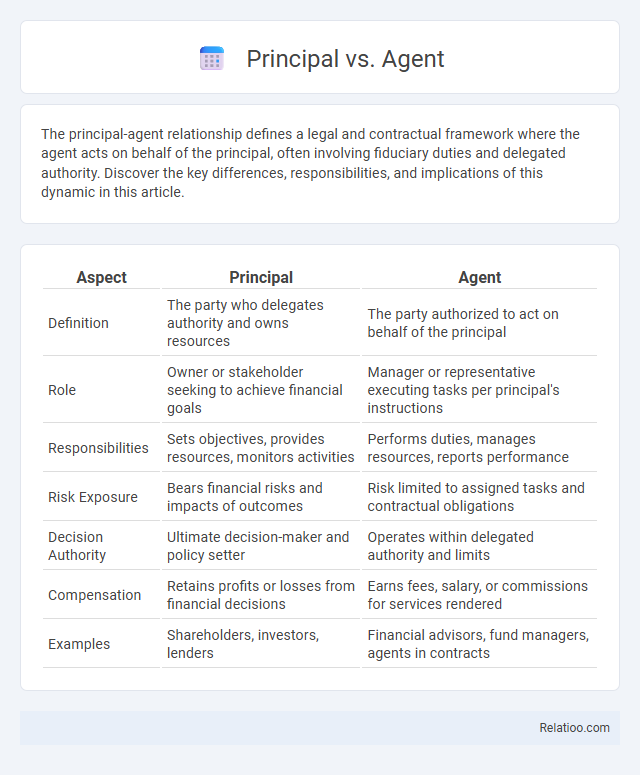The principal-agent relationship defines a legal and contractual framework where the agent acts on behalf of the principal, often involving fiduciary duties and delegated authority. Discover the key differences, responsibilities, and implications of this dynamic in this article.
Table of Comparison
| Aspect | Principal | Agent |
|---|---|---|
| Definition | The party who delegates authority and owns resources | The party authorized to act on behalf of the principal |
| Role | Owner or stakeholder seeking to achieve financial goals | Manager or representative executing tasks per principal's instructions |
| Responsibilities | Sets objectives, provides resources, monitors activities | Performs duties, manages resources, reports performance |
| Risk Exposure | Bears financial risks and impacts of outcomes | Risk limited to assigned tasks and contractual obligations |
| Decision Authority | Ultimate decision-maker and policy setter | Operates within delegated authority and limits |
| Compensation | Retains profits or losses from financial decisions | Earns fees, salary, or commissions for services rendered |
| Examples | Shareholders, investors, lenders | Financial advisors, fund managers, agents in contracts |
Understanding the Principal-Agent Relationship
Understanding the principal-agent relationship involves recognizing how the principal delegates authority to an agent to act on their behalf, creating a fiduciary duty rooted in trust and accountability. You must be aware that the agent's actions legally bind the principal, making clear communication and defined responsibilities essential to prevent conflicts of interest. This dynamic ensures efficient management and decision-making while aligning the agent's actions with the principal's objectives.
Key Roles and Responsibilities
Principal holds ultimate authority and liability, setting goals and providing resources for the agent to act on their behalf. Agent executes tasks, makes decisions within delegated authority, and ensures actions align with the principal's interests. Understanding your role as either principal or agent clarifies accountability and streamlines communication in business or legal arrangements.
Principal vs Agent: Core Differences
The principal delegates authority to the agent to act on their behalf, creating a fiduciary relationship where the agent must prioritize the principal's interests. Control over decision-making and liability primarily resides with the principal, while the agent performs tasks within the scope defined by the principal. You should understand these roles to ensure clear responsibilities and legal protections in business arrangements.
Legal Foundations of the Relationship
The legal foundations of the Principal-Agent relationship revolve around fiduciary duties, where the agent is legally obligated to act in the best interests of the principal, including duties of loyalty, care, and obedience. Your understanding of agency law is crucial, as it establishes how contracts entered into by the agent bind the principal, and outlines the scope of authority granted. This legal framework ensures accountability and clarity in commercial and personal transactions involving principals and agents.
Duties Owed by the Agent to the Principal
The agent owes the principal fiduciary duties including loyalty, obedience, and care, ensuring actions align with the principal's interests and instructions. Duty of confidentiality requires the agent to protect sensitive information obtained during the agency relationship. The agent must also provide accurate accounting and timely communication regarding all transactions conducted on behalf of the principal.
Common Examples in Business and Law
In business and law, a principal refers to an individual or entity who authorizes an agent to act on their behalf in contractual or legal matters. Common examples include a company (principal) hiring a real estate agent to sell property or an employer (principal) delegating tasks to an employee (agent) under an agency agreement. Understanding these roles helps you navigate responsibilities, liabilities, and rights in various professional relationships.
Agency Problems and Conflicts of Interest
Principal-agent relationships often face agency problems arising from conflicts of interest, where agents may pursue personal goals over principals' objectives. Misaligned incentives and asymmetric information contribute to inefficiencies, leading to monitoring costs and moral hazard. Effective governance mechanisms, such as performance-based contracts and oversight, are critical to mitigating these conflicts in corporate and contractual environments.
How to Align Principal and Agent Interests
Aligning Principal and Agent interests requires clear contractual incentives that reward performance directly linked to the principal's goals, such as profit-sharing or bonuses based on measurable outcomes. Transparency in communication fosters trust, enabling both parties to understand expectations and reduce information asymmetry. You can enhance alignment by implementing monitoring mechanisms and regular feedback loops to ensure agents act in the principal's best interest.
Remedies for Breach of Duty
When a Principal faces a breach of duty by an Agent, remedies include damages, rescission of contracts, and equitable relief such as injunctions to protect Your interests. Agents breaching fiduciary duties may be liable for profits made, compensate for losses, or be subject to specific performance in cases involving confidential information. Courts emphasize restoring the Principal's position and deterring future breaches through tailored legal and equitable remedies.
Practical Tips for Effective Principal-Agent Relationships
Clear communication and well-defined contracts are essential for fostering trust and accountability in principal-agent relationships. Regular performance reviews and transparent reporting help align goals and mitigate conflicts of interest. Leveraging technology for real-time updates and maintaining mutual understanding enhances collaboration and ensures smooth decision-making.

Infographic: Principal vs Agent
 relatioo.com
relatioo.com